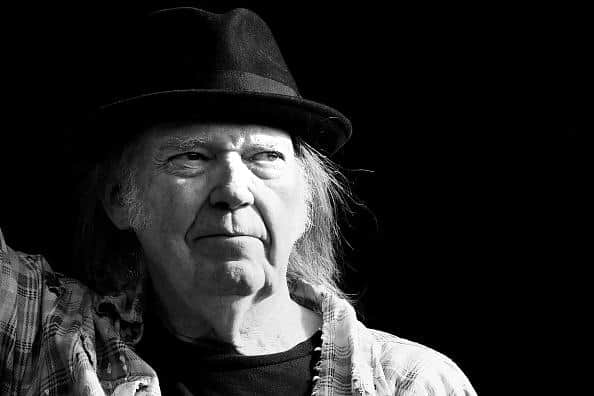Spotify row: Neil Young's stance serves as a reminder of the moral responsibility of platforms - Dani Garavelli
Their pronouncements - some of them demonstrably false - have amplified conspiracy theories which germinate in the nether regions of the internet, making them a legitimate topic for mainstream discussion. So, it was a breath of fresh air to see Neil Young take on Spotify for giving such views a platform and for profiting from their promulgation.
A survivor of polio, Young could be expected to disapprove of comedian-turned-podcaster Rogan's myth-peddling. He contracted the disease in 1952, three years before the first vaccines were introduced. Very soon, the number of cases started to drop. Polio was eradicated in North America by 1979.
Advertisement
Hide AdAdvertisement
Hide AdYoung also has a track record of sticking it to the man. The summer before the pandemic, he threatened to pull out of a concert with Bob Dylan in Hyde Park because the festival was sponsored by “fossil fuel funding entity” Barclaycard. The promoters backed down, and the Young/Dylan concert went ahead as a stand-alone gig.


Young was never going to win a similar victory against Spotify which makes his act of defiance commendable. More than 270 US experts had written an open letter to the streaming service, expressing concern about misinformation on The Joe Rogan Experience podcast. Young issued an ultimatum: Rogan or me.
Young may be a musical genius, but it is the podcast that brings in the big bucks. In late 2021, Spotify reported its revenue had increased by 27 per cent over the previous year and said the show was crucial to the growth in its podcast business. The singer’s back catalogue was quickly jettisoned.
The move cost Young 60 per cent of his streaming income. But his stance put down a marker. It served as a reminder of the moral responsibility all platforms have to ensure they aren’t promoting misinformation. And of how many of them have abnegated that responsibility.
The worst offenders are flagrant. Fox News has allowed some of its biggest stars to compare vaccine mandates to apartheid and refer to mask-wearing as a “cult”. Last week, writer and conspiracy theorist Alex Berenson told chat show host Tucker Carlson the Covid vaccines should be withdrawn. This on a programme, which attracts 3.2m viewers a night, to a population which is 40 per cent unjagged, in a country without universal healthcare.
At the BBC, the problem is more insidious. The broadcaster encourages sceptics to take part in radio phone-ins or debate shows in the name of “balance”. Recently Fiona Bruce went so far as to appeal to unvaccinated people to come into the Question Time studio, a move that seemed medically as well as ideologically injudicious.
Her call followed concerns the programme was failing to represent the 10 per cent of British people who are vaccine refuseniks. But - surprise, surprise - some militant anti-vax groups mobilised, encouraging members to apply. And now Question Time has been forced to bring in disinformation experts to vet prospective audience members .
It's not always an easy call. On Friday, the BBC’s website carried interviews with some of the UK’s 70,000 unvaccinated NHS workers. On one level, this was a bona fide journalistic exercise. Health Secretary Sajid Javid had said all unvaccinated workers would be sacked. Of course those whose jobs are under threat should have their say. Other advocates for platforming vaccine scepticism argue unscientific views should be aired so they can be debunked. But we know from bitter experience this is not what happens. Rather, giving oxygen to extreme views normalises them. It makes them credible.
Advertisement
Hide AdAdvertisement
Hide AdTucker Carlson Tonight and Question Time are worlds apart. What unites them is their quest for more viewers. Extreme voices increase ratings, and so disinformation flourishes.
Those social media platforms which were Ground Zero for fake news have begun to understand the damage done. Facebook has pledged to oust the Covid deniers and anti-vaxxers, with Trump an early casualty of the new social media crackdown.
But watchdog organisations say misinformation continues to spread. In November, one such group - NewsGuard - claimed 20 Facebook and Instagram accounts promoting vaccine scepticism had gained 370,000 followers in the previous year. These included the Facebook pages of Robert F Kennedy Jr, a prominent anti-vaxxer, and Joseph Mercola, an alternative medicine doctor. NewsGuard blamed the company’s “engagement at all costs mantra” for its failure to adequately tackle the problem.
Commercial imperatives drive everything. They are the reason Spotify - which paid £82m for exclusive rights to Rogan’s podcast - chose him over Young. Meanwhile, subscription newsletter service Substack last week cited a desire not to intensify public distrust with censorship as its justification for not banning five anti-vax writers, including Berenson. Substack takes 10 per cent of the £1.85m plus those writers are collectively making. How lucky for the company that its principles allow - nay dictate - it should keep its cut.
Joni Mitchell – who contracted polio as a child – says she too will remove her music from Spotify. And Young's move prompted subscribers to mull over the company's failings. A discussion about Rogan widened out to its alleged poor sound quality and low payouts to artists. For a while #CancelSpotify was trending on Twitter.
This wasn't responsible for the drop in the company’s stock price, which has been happening over the last 12 months. But it won't have helped. The company’s fortunes are volatile. Young’s ultimatum alone couldn't force its hand. But if public disapproval were to further dent its finances, then perhaps it would begin to take its responsibilities on disinformation seriously.
Comments
Want to join the conversation? Please or to comment on this article.